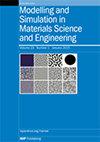以数据为中心的材料科学路线图
IF 2.4
4区 材料科学
Q3 MATERIALS SCIENCE, MULTIDISCIPLINARY
Modelling and Simulation in Materials Science and Engineering
Pub Date : 2024-07-02
DOI:10.1088/1361-651x/ad4d0d
引用次数: 0
摘要
科学始终以数据为基础,但 "以数据为中心 "和材料研究的 "第四范式 "表明,信息检索、处理和研究的方式发生了根本性变化。它标志着向管理大量数据集合、数字资料库和创新数据分析方法的转型。人工智能及其子集机器学习的整合已成为应对所有这些挑战的关键。本《以数据为中心的材料科学路线图》探讨了基本概念和方法,说明了电子结构理论、软物质理论、微观结构研究以及光发射、原子探针断层扫描和电子显微镜等实验技术的各种应用。虽然路线图深入研究了材料科学这一广泛的跨学科领域中的特定领域,但所提供的示例阐明了适用于更广泛主题的关键概念。所讨论的实例为解决当代材料研究中遇到的多方面挑战提供了真知灼见。本文章由计算机程序翻译,如有差异,请以英文原文为准。
Roadmap on data-centric materials science
Science is and always has been based on data, but the terms ‘data-centric’ and the ‘4th paradigm’ of materials research indicate a radical change in how information is retrieved, handled and research is performed. It signifies a transformative shift towards managing vast data collections, digital repositories, and innovative data analytics methods. The integration of artificial intelligence and its subset machine learning, has become pivotal in addressing all these challenges. This Roadmap on Data-Centric Materials Science explores fundamental concepts and methodologies, illustrating diverse applications in electronic-structure theory, soft matter theory, microstructure research, and experimental techniques like photoemission, atom probe tomography, and electron microscopy. While the roadmap delves into specific areas within the broad interdisciplinary field of materials science, the provided examples elucidate key concepts applicable to a wider range of topics. The discussed instances offer insights into addressing the multifaceted challenges encountered in contemporary materials research.
求助全文
通过发布文献求助,成功后即可免费获取论文全文。
去求助
来源期刊
CiteScore
3.30
自引率
5.60%
发文量
96
审稿时长
1.7 months
期刊介绍:
Serving the multidisciplinary materials community, the journal aims to publish new research work that advances the understanding and prediction of material behaviour at scales from atomistic to macroscopic through modelling and simulation.
Subject coverage:
Modelling and/or simulation across materials science that emphasizes fundamental materials issues advancing the understanding and prediction of material behaviour. Interdisciplinary research that tackles challenging and complex materials problems where the governing phenomena may span different scales of materials behaviour, with an emphasis on the development of quantitative approaches to explain and predict experimental observations. Material processing that advances the fundamental materials science and engineering underpinning the connection between processing and properties. Covering all classes of materials, and mechanical, microstructural, electronic, chemical, biological, and optical properties.

 求助内容:
求助内容: 应助结果提醒方式:
应助结果提醒方式:


